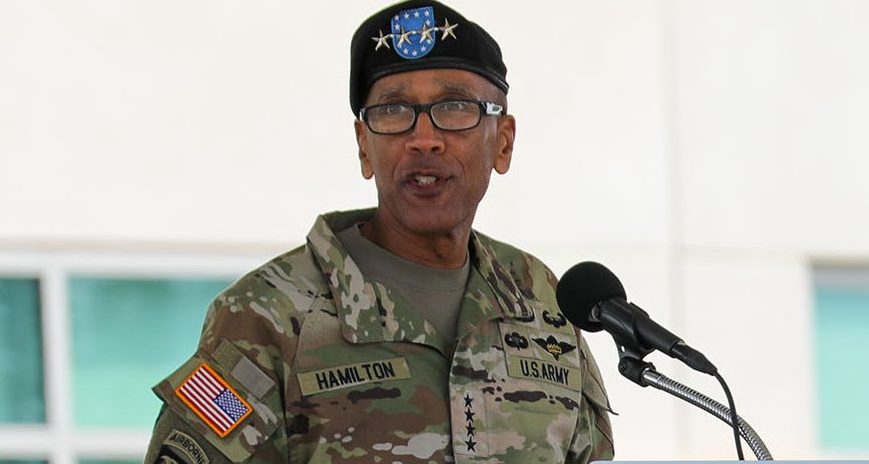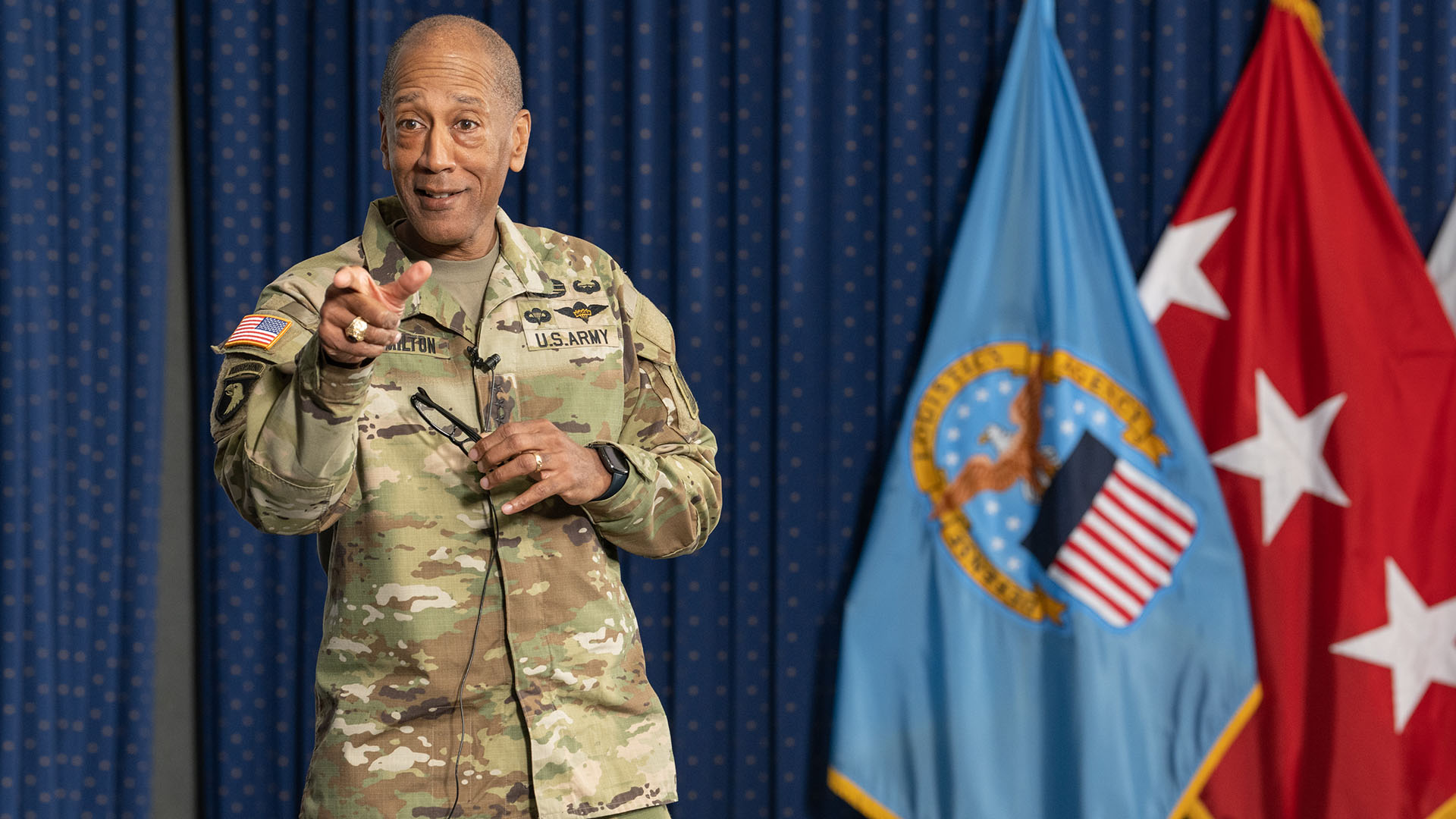
A four-star general suspended by the Army earlier this year says the supposedly anonymous panels the Army uses to select field-grade commanders are inherently stacked against Black candidates, both before and during the formal selection process.
Gen. Charles Hamilton was suspended as the commander of Army Materiel Command on March 22 after accusations emerged that he used undue influence to help a Black female lieutenant colonel land on a promotion list.
Hamilton defended his conduct in that case in a letter addressed to the Secretary of the Army, obtained by Task & Purpose. Hamilton said his interests and actions in the Lt. Col.’s case were both proper and an effort to protect a subordinate from being “sabotaged” by the Army’s program for selecting battalion commanders, which he believes introduces built-in bias against Black candidates.
Wormuth suspended Hamilton after Military.com reported that the director of the Army’s selection process — known as the Command Assessment Program or CAP — accused Hamilton of pressuring Army officials to select a lieutenant colonel for command. Wormuth directed the matter to be reviewed by the Department of Defense Inspector General’s office, a report which Wormuth is expected to see soon.
In Hamilton’s letter, written last week, the four-star general asked to be reinstated as the head of Army Materiel Command, and he laid out his case in both the lieutenant colonel’s promotion and his view on the CAP process.
“Removing photographs from personnel files and providing unconscious bias training for panelists is not enough,” Hamilton wrote in an Aug. 16 letter to Wortmuth. “By the time a Minority officer sits before a Command Assessment Program panel, the bias and racism that exists in our Army culture is already cemented into evaluation reports, peer assessments, and opinions of decision makers.”
Subscribe to Task & Purpose today. Get the latest military news and culture in your inbox daily.
Hamilton wrote that he was always open and transparent about advocating for the lieutenant colonel, whom Task & Purpose is not identifying because there is no evidence she violated any Army policies. He also denied using his rank and position to give the lieutenant colonel an unfair advantage over other officers. He noted that he has advocated in favor of many officers during his 43-year Army career, including white officers, but that this is the first time he has been accused of favoritism.
The tone of Hamilton’s letter suggests that he expects Wormuth to act against him after the IG report is finalized.
“I acknowledge you may nonetheless take adverse action against me even though my advocacy for Minority leaders like [the lieutenant colonel] has been completely transparent and above board,” Hamilton wrote. “Regardless of what decision you make regarding my fate, I implore you to investigate why the Command Assessment Program deems so few Minority officers as ready for command and what barriers exist that make qualified Black officers unwilling to subject themselves to that process”
When asked about Hamilton’s letter to Wormuth, Army spokeswoman Cynthia Smith provided Task & Purpose with a brief statement: “We are aware of the letter, but cannot comment due to the ongoing investigation.”
At issue is the integrity of the Army Command Assessment Program, or CAP, which evaluates sergeants major, lieutenant colonels, and full colonels for command assignments.
Hamilton allegedly took several actions to give a lieutenant colonel an unfair advantage when she appeared before the Battalion Command Assessment Program, Military.com reported, including asking for sensitive information about the officer’s subordinate and peer reviews, personally observing the first panel, criticizing remarks from a psychologist during the first panel as “too negative,” asking for the lieutenant colonel to appear before a second panel, discussing the lieutenant colonel with the panelists before the second panel convened, and repeatedly asking Army officials on the morning of the second panel how the interview with the lieutenant colonel was going.
Ultimately, both panels decided she was not ready for command, but the officer’s name was still placed on a selection list for battalion command. Her name was later removed after Military.com’s reporting.
In his letter to Wormuth, Hamilton acknowledged that he contacted general officers whom he believed were on command assessment programs about what they focus on when reviewing a candidate’s file, but insisted that he did not try to influence the results of the lieutenant colonel’s second panel.

“It is true — I contacted general officers whom I believed were on Command Assessment Program panels,” Hamilton wrote. “However, I never pressured or even asked any of them to deem [the lieutenant colonel] ready for command.”
But beyond the single case of the Lt. Col., Hamilton’s letter lays out his belief that the CAP program disadvantages Black and other non-white candidates. He cited aselection rate for Black officers since the program’s inception that averaged close to 10% with a single yearly high of 15%, while the pool of candidates was 22% Black.
Task & Purpose was able to confirm that the CAP selection rates Hamilton’s letter cite match his cited source, briefing slides on the CAP program presented to senior Army commanders. While Task & Purpose could not confirm the make-up of the CAP candidate pool, Black officers make up about 10% of all Army officer ranks below that of generals.
He also wrote that the Army’s vice chief of staff told general officers that 72% of eligible Black officers have opted out of the program.
Jokes and a plan to ‘light her up’
Hamilton argued that the CAP program’s problems with racism are evident in the lieutenant colonel’s case. He wrote that an officer whom he trusts told him about overhearing the lieutenant colonel’s peers talking about how they planned to use their CAP assessments to sabotage her opportunity to be selected for command.
“He said they intended to ‘light her up,’” Hamilton wrote. “Sadly, and as much as we senior leaders wish to believe this does not happen in our formations, it does, and often, directly at minority officers.”
Initially, Hamilton did not take any actions based on what the officer had told him, he wrote. Later, he received an invitation from Col. Robert O’Brien, CAP’s executive director, to observe the lieutenant colonel’s panel.
Task & Purpose has obtained an email from O’Brien to Hamilton and others inviting them to attend the CAP program on any day that fit their schedules between Sept. 29 and Nov. 11, 2023.
Prior to the lieutenant colonel’s interview, Hamilton was provided with her peer assessments, which confirmed what the officer had told him, he wrote.
“More shocking, I observed the psychologist unprofessionally joking and making unfair conclusions with the panel prior to her interview about what he read in [the lieutenant colonel’s] assessments,” Hamilton wrote. “Though [the lieutenant colonel] acquitted herself well, she could not overcome the weight of the unfair peer bias.”
At the end of the panel interview, Col. Townley Hedrick, CAP’s deputy executive director, asked Hamilton about how he felt the panel went and mentioned the possibility that she could appear before another panel, Hamilton wrote.
“I did not ask for this, nor did I intentionally give him the impression I wanted her to be repaneled,” Hamilton wrote. “I told him that I was unaware repaneling was an option the Army offered. I agreed with his recommendation that it would be appropriate. Colonel Hedrick asked for my cell number, which I provided so that he could keep me updated about [the lieutenant colonel’s] repanel. I thanked Colonel Hedrick for his help.”
Hamilton wrote that he later learned that at least 11 officers in the same cycle had also been repaneled.
After the lieutenant colonel was rejected for command the second time, Hamilton voiced his concerns about the selection process to Lt. Gen. Walter Piatt, director of the Army Staff. Piatt asked if Hamilton could write a memo about why the lieutenant colonel deserved to be selected as a battalion commander and to collect letters of recommendation for her, both of which he provided. He also met with Piatt and Army Chief of Staff Gen. Randy George on the matter.
IG investigation
Hamilton also wrote that he was concerned about the motives of inspector general investigators.
“I would be remiss if I did not briefly address my own feelings of racism underlying this investigation,” Hamilton wrote. “I have heard from witnesses interviewed by the Inspector General investigator that they were asked about my associations with The ROCKS, Inc., a mentoring group, and Kappa Alpha Psi Fraternity, a community service organization. I am concerned as to why the investigator thought my associations with Black affinity groups was relevant to her investigation. I can only speculate it is because in the investigator’s mind whether an act is ‘mentorship’ or ‘interference’ depends on the senior officer’s race. I have faith you see things differently.”
Hamilton argued the CAP program does not take into account the systemic racism that Army officers face. He cited two instances of overt racial harassment leveled against officers he knew in different areas of the army as examples of wide-spread bias faced by Black and non-white soldiers — a bias he believes trickles into even the carefully controlled CAP system.
“After being disrespected and discriminated against in favor of White peers, how likely is it that these minority officers feel they would receive a fair assessment at the Command Assessment Program, especially if their White peers were asked to write peer assessments for them?” Hamilton wrote. “I posit that situations such as this are why many Black officers opt out of even being considered for command opportunities.”
